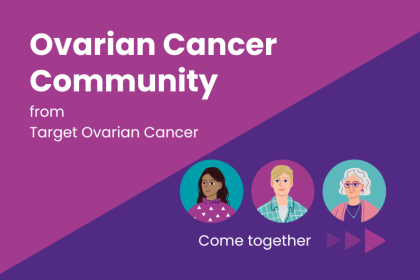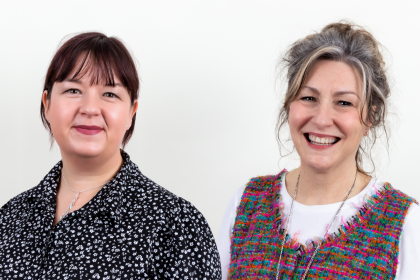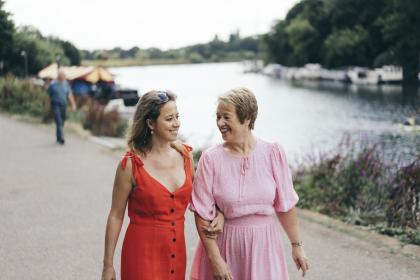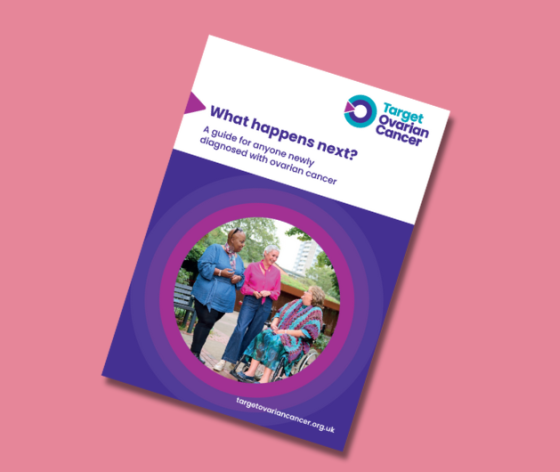Relationships with family, friends and partners
Ovarian cancer can change how you feel about yourself. It can also have an impact on your relationships. You may find that it brings you closer to the people around you, or your relationships could become more strained. Your friends and family may also find life after your diagnosis hard to deal with. Friends may want to support you but may be very busy with their own families and work.
It can be helpful for your family and friends to get support to cope with your diagnosis. You may feel better knowing they are supported. Target Ovarian Cancer can give support for family, friends and carers, so ask them to get in touch with our support line.
You can also talk to your clinical nurse specialist (CNS) about what other support there may be in your area for loved ones.
I had a lot of help from my family and friends. Them knowing what I was about to go through and what it meant helped me a lot. They were a huge support to me and I wouldn’t have got through it without them.” Anita
Telling people about your diagnosis
Who you tell about your diagnosis, when you tell them, and how you tell them is up to you. If you need to take a few hours, a few days, or longer to think about this, that’s okay.
It can help to be as truthful as possible about your diagnosis from the start and have an open conversation with family members or friends about how you’re both feeling. This can create a mutual understanding about how you talk about your diagnosis with each other going forward and reduce any extra burden on you.
It's not unusual for family or friends to cry or become very quiet. This can be hard for you to cope with. It might feel as though people are avoiding you or they don’t seem to speak to you in the same way as before. Often people are worried about saying the wrong thing or upsetting you. They may simply need reminding that you’re the same person as before your diagnosis.
Taking your time to prepare and telling others when you feel strong enough to cope with their reaction will help you. If you feel that telling people might be too difficult for you, you can ask someone you trust to tell people for you. If you want to tell people yourself, it’s important to do it in a way that is most comfortable for you. This may be face to face, particularly if you have a really close relationship, or over the phone or email for wider friends and family.
Macmillan has more information to help you tell people about your diagnosis. They also have information about emotional support for family and friends.
Maggie’s centres also offer support to families.
Hear from Kate and Deena about what helped them cope with their family member's diagnosis of ovarian cancer.
Telling children
Talking to children or grandchildren about a cancer diagnosis is not easy, whatever their age. Young children will often understand the practical side of things. They may understand that you have an illness and the doctors are looking after you. They may be aware that you might feel a little bit tired or sad, and that everyone is doing their best to get you better. The questions they ask can help you understand what is worrying them.
Teenagers may ask for more information. They may need a little more time to work through their feelings and think about the questions they want to ask.
Even when your children are adults themselves, finding out that a parent has cancer can be difficult to cope with. It can help to be open and honest with them about your diagnosis and how you are feeling. What you have been told about your diagnosis will have an impact on how you feel about what you want to say.
Your CNS may be able to put you in touch with a family worker to help support you and your children as you come to terms with the news.
Macmillan has more information to help you talk to children and teenagers and to help you understand their reactions.
Hereditary ovarian cancer
Hereditary ovarian cancer is ovarian cancer that has developed because of a gene variant that has been passed on through one generation of a family to the next. It is most commonly caused by a variation in either the BRCA1 or BRCA2 genes. Some variants in other genes can also increase the risk of ovarian cancer.
If you're worried that other family members may be at risk of ovarian cancer we have lots of information on hereditary ovarian cancer.






